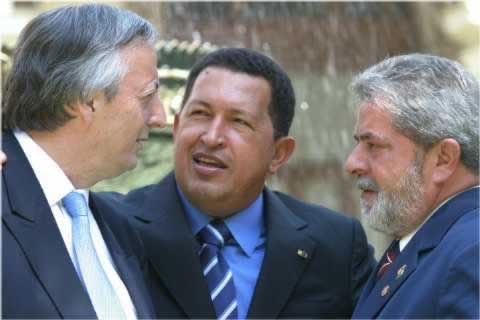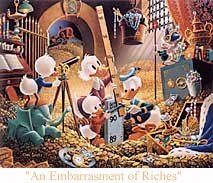 The Emperor wannabe and two of his three accomplices
The Emperor wannabe and two of his three accomplices
PMBComment: another insightful article from the Economist. Hugo Chávez, a.k.a. the Nouveau Latin Imperialist, took too big a bite and is now suffering the consequences. Are these setbacks temporary or permanent? in Bolivia and Peru he showed his true colors and the world saw it all up-close and personal; as a result, from now on he will be scrutinized much closer and hugged less warmly. It is not the end of Bolivarian shananigans, but maybe the beginning of the beginning of the end.
One would surely expect that Lula, Kirchner and Bachelet understand the profound – and all-too-obvious - absurdity of three "leftist" (progressive?) governments from countries that endured severe trauma under military autocracies posing as the main hemispheric cheerleaders for a man that Carlos Fuentes (no doubt about his leftist credentials) called a "little, tropical Mussolini". Self interest is a critical and to-be-expected element of every country's foreign policy (and maybe the only thing going for Mr. K), adherence to universal principals comes in handy (particularly for wannabes like Brazil and Chile), but pandering to dictators and autocrats is always dicey business for democrats seeking to be taken seriously.
As it becomes increasingly obvious that there will not be conditions for a fair and free election in Venezuela this coming December, it will be appropriate for freedom loving citizens of Venezuela to point condemningly at this trio of neglectful accessories to the destruction of our country. PMB
PS: Where I disagree with the Economist is on their assessment of the upcoming vote for the UN Security Council. My bet is that Brazil - trying to save its own hopes of a permanent seat - will seek a consensus candidate (Uruguay?) and then Chile and Argentina will quietly abandon Hugo. Bolivarian Venezuela’s dreams of a universal bully pulpit dashed as a result of disproportionate meddling and unbearable rhetoric. Wishful thinking? Or a real-politik plan already in motion?
The Economist
Venezuela's foreign policy
Bruised but unbowed
Jun 8th 2006 | CARACAS AND SÃO PAULO
From The Economist print edition
A setback in Peru does not presage the end of Hugo Chávez's regional influence
“TONIGHT, the country has sent a message of sovereignty and national independence and defeated Señor Hugo Chávez's efforts to incorporate us in his expansionist strategy,” declared Alan García after narrowly winning Peru's presidential election. Never before has Mr Chávez, Venezuela's radical populist president, intervened so blatantly in an election in a neighbouring country as he did on behalf of Ollanta Humala, the defeated candidate in Peru, who like himself is a nationalist former army officer. Of Mr García, he said last month: “I pray to God that he won't become president.” He threatened to break diplomatic relations with Peru if he did.
So although Latin Americans, like electorates everywhere, tend to vote according to national issues, in this case Mr Humala's defeat—narrow though it was —was also that of Mr Chávez. But from the perspective of Venezuela's president, who often suggests that he will remain in power for the next 25 years, the setback may only look temporary.
Mr Chávez's overriding aim is to defeat efforts by the United States to isolate his “Bolivarian Revolution”. To this end he seeks clients and allies abroad. In this diplomatic battle, Latin America is the main theatre and Venezuela's oil wealth the main weapon. Mr Chávez won an important victory with the election of Evo Morales, a socialist, in Bolivia. In April, Bolivia joined the “Bolivarian Alternative”, an anti-American alliance involving Venezuela and Fidel Castro's Cuba.
Venezuela has ramped up aid to Mr Morales's government. Mr Chávez is a frequent visitor to Bolivia. He has instructed its people on how they should reform their constitution, advised Mr Morales on the seizure of foreign-run gas fields, and told the army to prepare for an American-backed plan to overthrow the president. Peru would doubtless have received similar advice had Mr Humala won.
Mr Chávez may not, even now, have given up on Peru. He has often been accused, without proof, of financing not just the campaigns of left-wing parties, but street protests by social movements. If Mr Humala uses his support in Peru's southern Andes to make his country ungovernable, there will be accusations of Venezuelan involvement. In Bolivia, Mr Morales helped bring down two governments before winning December's election.
After the Peruvian rebuff, Mr Chávez still has hopes of gaining a new client in an election in November in another of the smaller Latin American countries: Nicaragua. There, he is supplying cheap fuel to mayors from the Sandinista Front, whose presidential candidate, Daniel Ortega, he supports. Yet there are signs that his meddling may be starting to backfire.
Inside Venezuela itself, Mr Chávez worked to polarise the country into two camps: those who were for him and those who were against. He also built up his power by destabilising those institutions that he could not control and creating new ones which he could. These tactics are now being exported to the regional stage. In the past two months, for example, Venezuela has walked out of the five-country Andean Community and a separate trade pact with Mexico and Colombia. No sooner was Venezuela offered full membership of Mercosur, the trade group based on Brazil and Argentina, than Mr Chávez started telling its smaller members that it should be changed or dismantled.
But not everything is going his way. Brazil is smarting from Mr Morales's nationalisation of natural-gas assets operated by Petrobras, its national oil company. There have been hints—but nothing more—that it may now distance itself from Mr Chávez. Peru's foreign minister said that Brazil was among eight countries that backed its complaint against Venezuela's meddling in its election at this week's meeting of foreign ministers from the Organisation of American States.
Another such hint is a planned bilateral meeting on energy integration between Brazil and Chile. Closeness between these two countries, both governed by the moderate left, is “fundamental” when “we're seeing a series of open and latent conflicts in South America,” said Alejandro Foxley, Chile's foreign minister, after meeting his Brazilian counterpart, Celso Amorim.
Brazil may also be cooling to Mr Chávez's pet scheme for a $20 billion pipeline to deliver gas from Venezuela to Brazil and Argentina across the Amazon. Petrobras has been an enthusiastic backer of this project, which is regarded by most others as a white elephant. But the company's president, José Sérgio Gabrielli, now sounds more cautious. He says he sees virtue in a “continental pipeline” uniting several sources of supply and several markets, but adds that this is a project for “the very long run.”
Yet there is still little appetite in the region for breaking altogether with Mr Chávez. He picks his enemies carefully, and stages tactical retreats when necessary. This week Venezuelan officials seemed to back away from the threat to cut relations with Peru, and Mr García struck an emollient note towards Mr Chávez. Brazil says it will back Venezuela for one of Latin America's two rotating seats on the UN Security Council later this year, rather than Guatemala, whose candidacy is backed by the United States. Chile is likely to follow suit. Mr Foxley refuses to criticise Mr Chávez directly. “We've learned in Chile the hard way to live with diversity,” he says. “We will not be judgmental.”
Mr Chávez still has plenty of oil money to dispense. That may not last forever. At a meeting last weekend in Caracas of the Organisation of Petroleum Exporting Countries (OPEC), Venezuela alone called for cuts in production quotas to drive prices higher. Many in the industry say Venezuela was pushing for lower quotas mainly because it cannot meet its existing one. Since Mr Chávez came to power, the output of PDVSA, the state-owned oil company, has slumped by a quarter. But he has burdened the company's engineers with many new commitments, from helping to develop Bolivia's gas reserves to building a refinery in Brazil.
At home, in 2002, Mr Chávez provoked his opponents into a coup which came close to toppling him. Sooner or later, he may make a similar mistake in foreign policy. His foes have reacted with jubilation to Mr Humala's defeat in Peru, seeing the beginning of the end of chavista influence in Latin America. Not quite yet.
Read more of this PMBComment!






